
Table of Contents
The real-estate industry is predominantly run by human expertise and manual processes including buying, selling, and building lands and property. And as digital revolution is driving the immense growth of the real estate industry. It is all due to Artificial intelligence playing a crucial role in advancing real-estate features such as Hyper-personalized User-experience, AI Chatbots and AI-powered Virtual Assistants, Property Analytics, Automated Property Management and much more.
And as these features get upgraded overtime, making real-estate app more accessible and user-friendly, meanwhile providing user-personalized smart recommendation and effective property analytics, seamless transactions, and faster resolution delivery of real-estate queries to help build advanced real-estate platforms. These platforms also leverage the AI tools to provide automated processes, enhanced decision-making, and overall improved customer experience to users.
AI has diluted down all the complex and sophisticated time-consuming processes of real-estate industry with automation and data-driven accuracy by using machine learning algorithms and AI-powered recommendation models. From historical land pricing and local area trends to ratings of schools, hospitals, and other local amenities, AI systems can analyze all such data points to provide accurate real-estate valuations. These systems can also identify the best real-estate deals for users, based on personal browser history, location tracking, and saved listings to deliver a personalized searching experience.
With the induction of AI-powered 3D-rendering and AI Chatbots, potential buyers can create a 3D-rendered digital image of the interested property, filled with digital interior and furniture to make a well-informed decision. Meanwhile, AI chatbots handle land inquiries and schedule visits.
And when it comes to investment, AI predictive models analyze millions of data points from various past statistics to future infrastructure projects to provide accurate pricing forecast of new neighbourhoods, enabling investors to invest in emerging markets and book massive profits. And streamlined secure transactions with the help of smart contracts, enabling automatic document verification, find fakes, and flag discrepancies based on pattern recognition.
In this blog, we’ll more about these AI tools, technologies, and platforms in details. We will also learn the limitations and challenges faced by AI adoption.
Also, in this blog for AI in commercial real estate, we’ll explore:
As the AI integration in real estate speeds-up, the apps will become faster, smarter, and more user-centric to provide most efficient results for finding top property deals. But most importantly AI development services are reshaping how we communicate with our devices and real-world as well. So, let’s look into the benefits of including AI in Real Estate App Development:
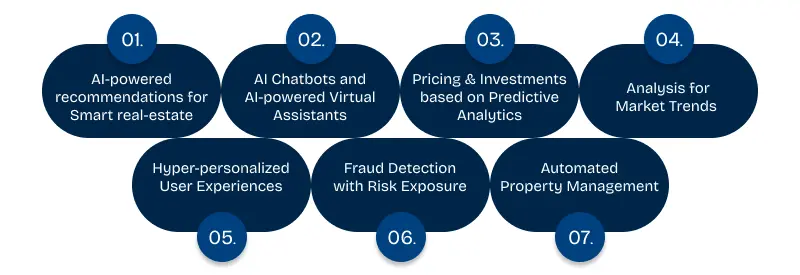
The earlier integration of machine learning models and AI-powered recommendation engines have become the most essential part of the real estate apps. These models not only provide various smart real-estate options but it can also help in predicting the value of such options as well. AI-powered real estate app ideas with machine learning models can train themselves to suggest reliable properties based on user preference and user behavior, analyzing clicks, searches, and saved listings based on user history and market trends overtime. And as these Machine learning models become far much efficient with regular training, they provide faster enhanced suggestions with time, much like Amazon or Netflix recommendations.
The real-estate industry requires 24/7 attention for announcements and queries. The use of AI chatbots in real estate industry help users by providing all day long customer supports with the help of real estate apps. They can also create and provide answers to FAQs such as pricing, location queries, amenities, and mortgage options. These AI-powered virtual assistants are also state-of-the-art and can schedule property visits through real estate apps. It also gets better as it gathers more and more relevant information.
Before planning to invest or purchase properties, users require various types of information to come to a conclusion which can lead to a prolonged delay in process. This helps users in making smart-decision and saving money based on all-available information.
Build your own modern AI real-estate app to propel your business forward with Konstant Infosolutions, an AI development services company
AI-driven real-estate apps run analysis in market behaviors to help buyers and investors in providing data-driven outcomes. Firstly, all the data related to the project is collected and then run through AI-driven market analysis. After that various investment options tailored to your specific needs are displayed.
Each and every users interacts with AI in commercial real estate in their own way. And AI-powered tools and machine leaning algorithms record and analyze these unique interactions to create a use-friendly journey to provide a hyper-personalized space to each user. All the recoded interactions for predictive programming enable AI-driven real-estate apps to offer customized property feeds to user for investment. These hyper-personalized user experiences provide property deals with flexible financing options to potential buyers.
In the real-estate industry, the emergence of fakes and frauds have become very troublesome for potential buyers interested in certain properties. And to clean such fakes and frauds from the listings, modern real estate app ideas incorporate effective AI algorithms and models that can find fakes, and flag discrepancies based on pattern recognition. These AI algorithms with streamlined secure transactions enable the detection of various anomalies and irregularities in transaction patterns, saving user’s hard-earned money and resources. The AI-powered tools and algorithms can also expose suspicious buyer/seller behavior before they come in contact, allowing accurate verification of property data over a period of time to reduce frauds.
One of the most important usages of AI-powered real-estates apps is to automate all the management of properties and investments. The artificial intelligence in real estate apps include algorithms and machine learning models that help in setting up processes for buying and selling properties based on previous dealings. Much of the selling and buying doesn’t even require user-interference after the successful integration of Automation tools. Most of the real-estate Investors and lenders utilize AI-powered algorithms and machine learning models to take faster, data-driven decisions. It also helps land owners in automating the process of rent collection from tenants. And owners can efficiently screen new tenants with the help of AI background checks which helps in reducing fakes and frauds.
See also:
The modern AI-driven real estate apps, which includes benefits such as smart recommendations, Virtual Assistants, predictive analysis, fraud detection and much more, enable some of the most prominent use-cases to help users in finding their favorite property in no time without falling pray to fakes and frauds. Let’s take a look at these advanced AI-enabled use-cases:
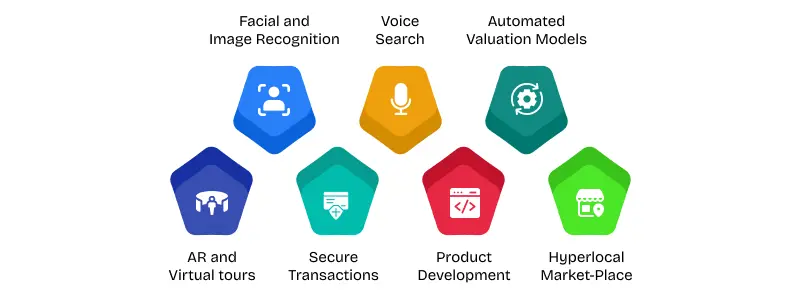
AI-powered real estate apps with the help of image scanning, enable performing scans on property photos which allows users to detect defects, quality of amenities, and renovation potential. This leads to better understanding of the property and faster decision making. And the facial recognition and seller analysis features also helps in detecting fakes and frauds from previous listing behaviors.
Example: Opendoor, Matterport
The Natural Language Processing and voice-activated search helps users in locating their favourite property deals and preferences quickly via voice commands. These tools offer faster and secured communication with the app which leads to less security breach.
Example: Realtor.com
Modern AI business ideas in real estate industry program automated valuation models (AVMs) to evaluate past data, neighborhood area trends, and other economic factors to forecast future market prices for investment purposes in lands and properties. These models can also help in finding detect defects, quality of amenities, renovation potential, saving time and money.
Example: Zillow Zestimate, Redfin Estimate
Modern AI-powered real estate apps can help users generate 3D rendering of walkthroughs of their favourite property with preferred home decor and interior design. And at the same time, AR lets users digitally visualize space with virtual furniture in empty homes for faster decision making. Users can take a tour through their favourite virtual houses which leads to less time spent than visiting physically.
Example: Zillow 3D Home
When it comes to the integration of Blockchain and AI Smart contracts, which can enable automated deals and transactions without third-party involvement can reduce paperwork significantly. And combined with with AI verification, the real-estate apps can easily identify and prevent fraud at much faster speeds. All this leads to reliable and secure transaction via AI-powered real-estate apps which results in efficient user convenience of doing business.
Repair and maintenance are one of the most crucial aspects of property evaluation. Modern AI Real estate apps will integrate effective IoT sensors and reliable AI-driven analytics to quickly predict when buildings would require repairs. And with the AR/VR integration, real-estate apps can help provide virtual mock-up repairs and development of efficient design plans.
With the increasing adoption of AI-powered tools and features for real-time data changes in neighborhoods, pricing, property listings, mortgage rates, demographic reports, crime statistics, school and other institution’s ratings, distance from newer airports and stations helps buyers and sellers in making well-informed decision. All this leads to creation of a hyper-local market where all the amenities for your needs are available in matter of minutes.
Get your own modern AI-Powered real-estate app to buy and sell lands with Konstant Infosolutions, a top AI development company
At an unprecedented speed, AI is empowering the modern real-estate industry with the help of data-driven ecosystem, process automation, and user-personalized solutions. All this leads to massive efficiency in doing business. More importantly, it empowers broking agents, investors, and land-owners with effective insights by crunching enormous amount of data from real-estate trends and valuation models to buyer-seller behavior and local area dynamics.
AI has not only empowered users with assisting them, it has transformed how users interact with all the features. AI chatbots provide effective solutions 24/7 for routine inquiries, AR/VR lets buyers reimagine properties with digital 3D rendering of furniture and interior design. Meanwhile, smart contracts helps with secure transactions and paperwork automation, reducing time for closing deals. And AI-powered fraud detection reads suspicious patterns and reduces the chances of loosing money and time to fakes.
Despite advantageous and evolving benefits in adoption of AI, integrating this into the real estate industry does come up with surprising concerns and hurdles. It could be security, compliance, or high costs of implementation. Let’s take a look:
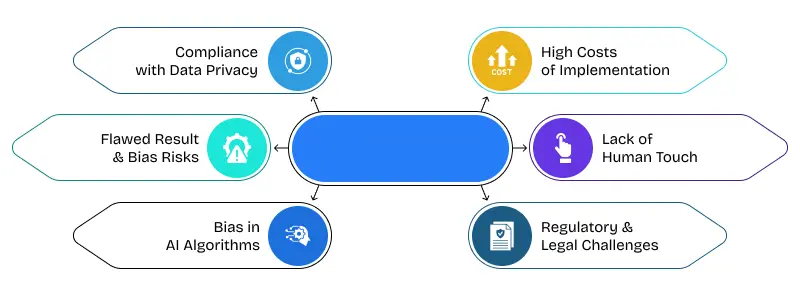
The AI real-estate apps records and manages highly sensitive user-data such as financial information, personal data, and proprietary details. The evolving threats of AI adoption make a good case for setting up higher standards of regulatory laws must for the AI development services and real-estate ecosystem to safeguard sensitive data. And when it comes to direct or indirect data collection practices, governing bodies have made significant strides in putting up strict regulations like GDPR and CCPA, safeguarding user data from potential breaches and hacks. In synchronicity, AI applications in real estate must also provide safe access to secure storage and participation in ethical AI use.
In the AI-driven real estate app development, AI-powered machine learning models and algorithms need to analyze millions of datasets to provide tailored and hyper-personalized responses to users and require a significant amount of massive cloud computing power to offer an exceptional user-centralized experience. All this ultimately require higher costs for AI adoption. And with small and medium enterprises struggling with receiving upfront investments because of the high costs which has led to lesser adoption of AI among them.
AI requires high-quality data to deliver exceptionally accurate results but in the case of poor-quality data which leads to flawed predictions, reducing the efficiency of accurate decision making. There has been recorded signs of AI inheriting various biases, making AI adoption unreliable and questionable. These practices include inaccurate valuations of property or unfair tenant requirements, resulting from biased and flawed model assumptions from training data. And to counter these bias and promote equality and fairness, the faster audits and regular updates of AI systems are required.
When it comes to finalizing deals over the AI applications in real estate, users refrain from such actions due to sensitivity and security of the transactions. Users still requires those human negotiation practices that are not possible over the apps.
There are reported Biases in AI models which can lead to discriminatory or unfair practices in real estate app development. These practices include inaccurate valuations of property or unfair tenant requirements, resulting from flawed model assumptions from training data. And to counter this bias and promote equality and fairness, the faster audits and regular updates of AI systems are required.
6. Regulatory & Legal Challenges
Developing an AI-powered real estate app can require adherence to unique legal and regulatory challenges. These challenges include compliance of regulatory laws like RERA, intellectual property rights, data privacy regulations and enhanced user trust.
Konstant Infosolutions can help you build a customized modern AI-real-estate app With our advance team of developers and engineers. Ready to leverage their mobile app development expertise to create a scalable, feature-rich, and user-friendly platform.
From UI Interface to feature development and post-launch support, at Konstant, we take care of all these for you.
Get your hands on an AI-Driven app for business needs with Konstant Infosolutions, a top mobile app development agency
The integration of AI development tools in real estate app development are not just future trends. They are becoming more of a catalyst of essential technology driving innovation and advancement in real-estate industry.
From hyper-personalized experience to automated valuations, these tools enhance efficiency, fair property valuations, faster registration, and user satisfaction.
After overcoming the challenges of AI, such data privacy, and bias risks, the AI-apps will become faster, secure and smart.
AI in real estate offers high-speed accuracy with help of reliable automation and accurate show of data-driven insights.
AI enhances property search results by user-personalizing recommendations via buyer behavior analysis and user-preferences.
No—it is not possible to replace real-estate agents because of human negotiation factor and relationship building. It can only assist agents with various tasks.
There are many challenges in AI adoption but the risk of Data privacy is the main concerns.
It’s valuable as it easily predicts market trends, provides faster optimization of spaces, and evaluates all investment risks for users.

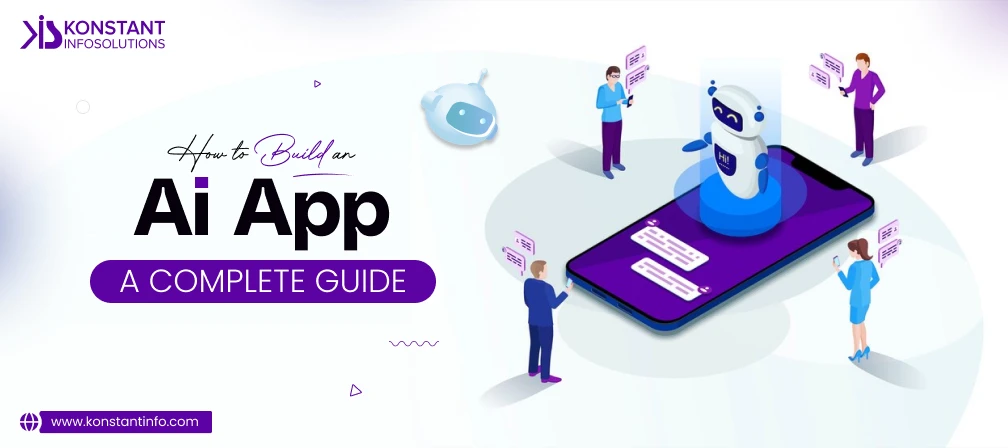
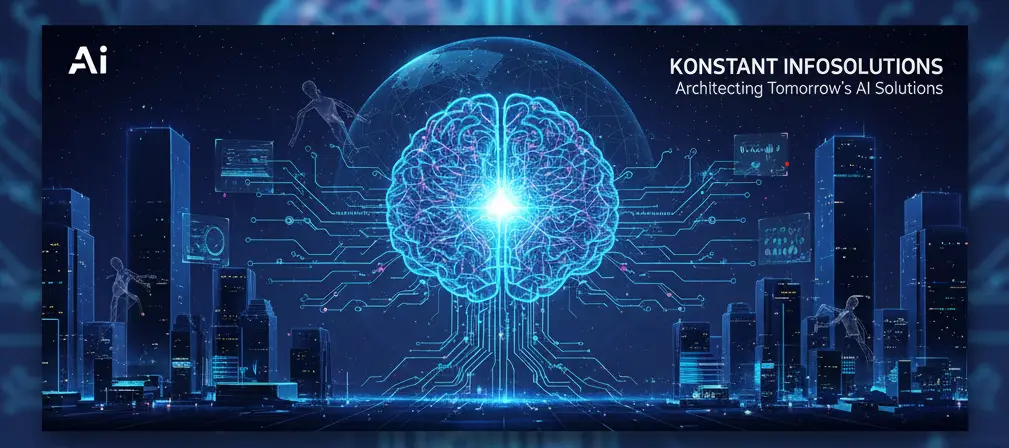
Vipin Jain is the Co-Founder and CEO at Konstant Infosolutions and is in charge of marketing, project management, administration and R&D at the company. With his marketing background, Vipin Jain has developed and honed the company’s vision, corporate structure & initiatives and its goals, and brought the company into the current era of success.
Or send us an email at: [email protected]